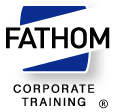The multi-generational office is nothing new. Most industries and types of businesses have always employed a range of personnel age groups. But the current generation gap is somehow getting wider; expanding to the point that it sometimes feels like the Grand Canyon. Although this is partly due to perception, there is definitely a shifting landscape in today’s workplace.
As Americans are living and working longer, four generations are now sharing the workplace for the first time in history: Traditionalists, Baby Boomers, Generation X and Millennials (also known as Generation Y). This situation is presenting new challenges for both managers and employees, often resulting in misunderstandings and productivity issues.
In a recent survey, one-third of workers reported that they had been insulted, hurt or upset by someone of a different generation at work; either because of a remark, a joke, an attitude or clothing choices. A real lack of awareness and understanding exists between these four distinct generations.
Typically, those of each generation feel they know best. Each group believes they know better than those who came before them, and certainly much better than the rookies that follow them into the workforce.
Closing the Gap
The key to resolving these issues is a close examination of the cultural differences that exist between the generations, helping co-workers foster more respectful relationships. This is especially important for managers who can use this knowledge to better motivate employees from each generation.
Let’s take the Millennials, for example. The generation born between 1980 and the mid-90s is a large force to be reckoned with — nearly three times the size of Generation X, and even outnumbering Baby Boomers.
According to a Pew Research Center study, Millennials overall are more educated, less motivated by salary, and more racially and ethnically diverse than older generations. They have fully embraced digital technology and social media, resulting in an abbreviated communication style, an “always connected” lifestyle, and less face-to-face interaction.
Awareness of the cultural differences and core values that make Millennials, and all the generations, unique can go a long way toward heading off potential conflicts and building a stronger, more efficient team.
I’m pleased to say that our Fathom training program Generations in the Workplace helps participants truly develop a more thorough understanding of the strengths that each generation brings to the workplace. When we view the workplace from someone else’s perspective, we can decrease negative judgments and stereotypes, improve decision-making, address motivational issues and successfully bridge the generation gap.
John Males is Founder and President of Fathom Corporate Training. With more than 20 years of experience in management, sales and negotiations, he helps clients increase employee satisfaction, lower turnover, increase revenue and raise profit margins.

